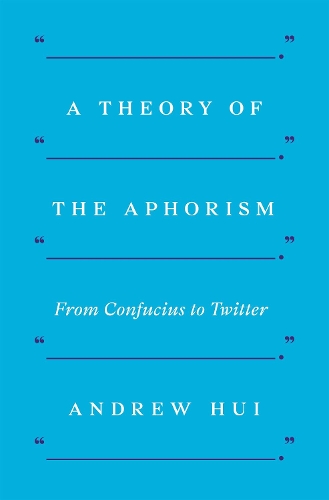
A Theory of the Aphorism: From Confucius to Twitter
(Paperback)
Available Formats
Publishing Details
A Theory of the Aphorism: From Confucius to Twitter
By (Author) Andrew Hui
Princeton University Press
Princeton University Press
15th February 2021
United States
Classifications
Tertiary Education
Non Fiction
History of ideas
Semantics, discourse analysis, stylistics
Dialect, slang and jargon
Popular culture
Philosophical traditions and schools of thought
808.882
Physical Properties
Paperback
272
Width 140mm, Height 216mm
Description
An engaging look at the aphorism, the shortest literary form, across time, languages, and cultures
Aphorisms or short philosophical sayings appear everywhere, from Confucius to Twitter, the Buddha to the Bible, Heraclitus to Nietzsche. Yet despite this ubiquity, the aphorism is the least studied literary form. What are its origins How did it develop Were the enigmatic sayings of charismatic sages the original 'social media' And why do some of our most celebrated modern philosophers use aphoristic fragments to convey their deepest ideas In A Theory of the Aphorism, Andrew Hui crisscrosses histories and cultures to answer these questions and more.
Encompassing literature, philology, and philosophy, A Theory of the Aphorism invites us to reflect anew on the meaning of this pithiest of literary forms.
'The history [Hui] has written is devoted to something more like what we usually call 'sayings'...Buy the premise and you'll enjoy the bit, as David Letterman, an aphorist of sorts himself, used to say.' Adam Gopnik,New Yorker
'This book is groundbreaking.' Nigel Warburton,Five Books
'Deeply informative and extremely lucid...Its ideal reader might have been Walter Benjamin.' Lachlan Mackinnon,Times Literary Supplement
'Fans of dense brevity will appreciate thatA Theory of the Aphorismis packed tight as a walnut...It is replete with small things.' Willis Goth Regier,World Literature Today
'Irresistible...Lovers of aphorisms will derive huge pleasure from this elegant and informative book.' Paradigm Explorer
Reviews
"One of FiveBooks' Best Philosophy Books of 2019"
Author Bio
Andrew Hui is associate professor of humanities at Yale-NUS College, Singapore. He is the author of The Poetics of Ruins in Renaissance Literature.
